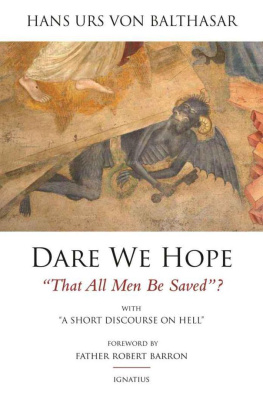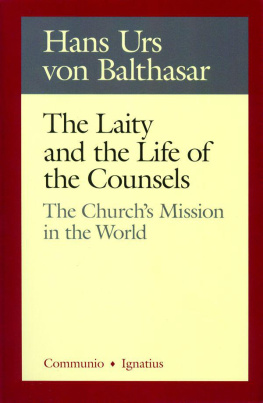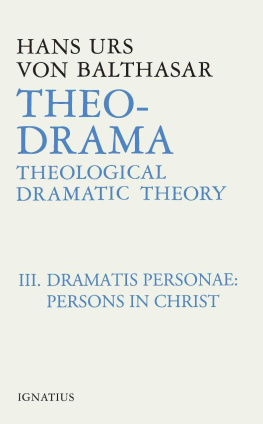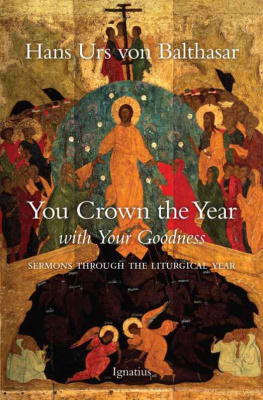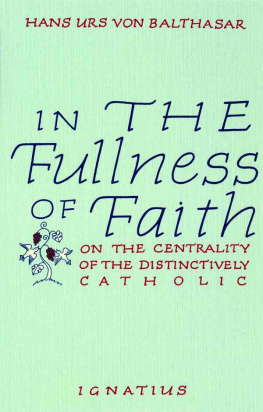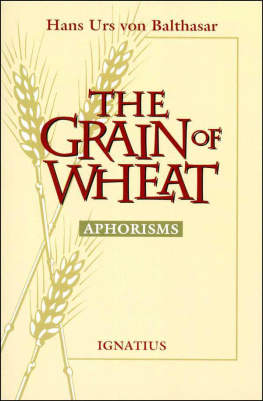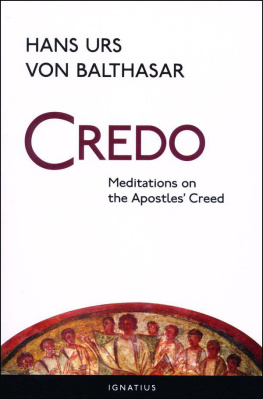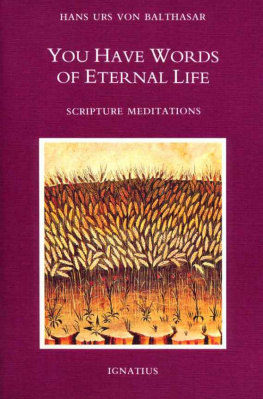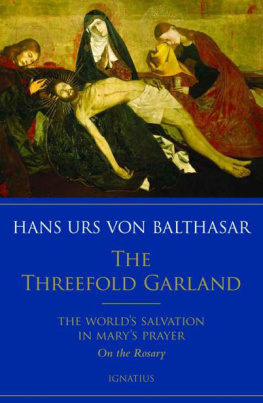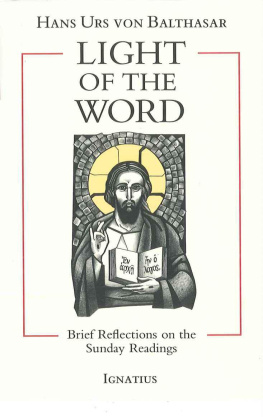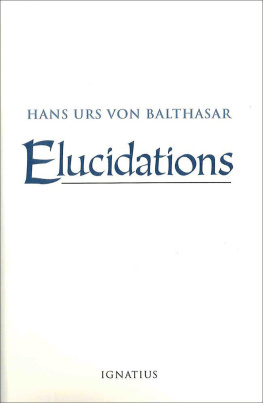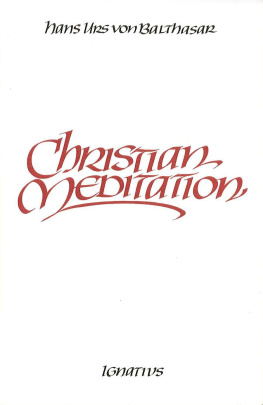DARE WE HOPE
THAT ALL MEN BE SAVED?
HANS URS VON BALTHASAR
DARE WE HOPE
THAT ALL MEN
BE SAVED?
With a
SHORT DISCOURSE ON HELL
Translated by Dr. David Kipp
and Rev. Lothar Krauth
Second Edition
With a Foreword by the
Very Rev. Robert Barron
IGNATIUS PRESS SAN FRANCISCO
Titles of the German originals:
Was drfen wir hoffen ?
1986 Johannes Verlag, Einsiedeln
and
Kleiner Diskurs ber die Hlle
1987, 1999 Schwabenverlag AG, Ostfildern
Kleiner Diskurs ber die Hlle
Apokatastasis: Gastvorlesung an der Theologischen Fakultt Trier
am 18. April 1988
1999 Johannes Verlag, Einsiedeln, Freiburg
Cover art:
Christ's descent into Hell (detail)
Andrea di Bonaiuto (fl. 13461379)
Fresco (post-restoration 2003-2004)
Spanish Chapel, S. Maria Novella, Florence, Italy
Scala / Art Resource, New York
Cover design by Roxanne Mei Lum
1988, 2014 by Ignatius Press, San Francisco
All rights reserved
ISBN 978-1-58617-942-7
Library of Congress Control Number 2014939098
Printed in the United States of America
Dedicated
to the Institute for
Transitional Studies
(ISTRA)
in gratitude
CONTENTS
DARE WE HOPE
THAT ALL MEN BE SAVED?
EPILOGUE: APOKATASTASIS: UNIVERSAL
RECONCILIATION
FOREWORD
by the
Very Rev. Robert Barron
It is curious indeed that a text so often characterized as advocating an easy universalism in regard to salvation actually commences with a clear statement that all men stand under the divine judgment. Whatever else Hans Urs von Balthasar says in this book, the one thing he is quite clearly not saying is that we have certain knowledge that all people will be saved. But he will insistin fact, it is the gravamen of his argumentthat we are permitted to hope that hell might be empty of men. That this proposition is controversial was evident from the moment this book was published, and it remains evident today. Take even the most cursory look at the extensive and vehement internet conversation surrounding this issue if you doubt me. In the opening pages of his book, Balthasar himself mentions a number of theologians and journalists who dismissed his speculations out of hand, some even questioning his orthodoxy. In very recent times, certain theologians have opined that Balthasars universalism has contributed mightily to the decline of the Churchs influence in the West and to an attenuating of her missionary impulse. In the more popular forums of discussion, one hears that Balthasars point of view runs counter to the explicit teaching of Jesus and to the witness of many of the saints.
How does Balthasar (and how can his advocates today) respond to these criticisms? His first move is to remind defenders of a crowded hell that the biblical witness in regard to this issue is, to say the least, complex. Alongside the many references to hell and those who will suffer therein, there are at least as many biblical evocations of universal salvation. To cite simply a few of the best known: And I, when I am lifted up from the earth, will draw all men to myself (Jn 12:32); and He has made known to us... the mystery of his will... as a plan for the fulness of time, to unite all things in him, things in heaven and things on earth (Eph 1:9-10); and of course, This is good, and it is acceptable in the sight of God our Savior, who desires all men to be saved and to come to the knowledge of the truth (1 Tim 2:3-4). That these passages rule out the certitude that many are in hell and justify at least the hope that hell might be empty strikes Balthasar as self-evident.
The testimony of the Fathers is, he convincingly shows, just as multivalent and textured. To be sure, Augustine and many of his colleagues in the Christian West advocated the harsh view that the vast majority of menthe massa damnata will find their way to hell. However, this teaching was countered by many weighty Fathers in the Christian East, including Gregory of Nyssa, Maximus the Confessor, and especially Origen of Alexandria, all of whom taught universal salvation, or something quite close to it. It is, therefore, simply not the case that a clear patristic consensus exists around the issue of a crowded hell. Furthermore, practically all the Fathers, both East and West, reject the view that hellempty or notis created by God. Rather, they hold that it is brought about by sinners themselves, whose resistance to the divine love produces suffering in them. In this context, Balthasar cites C. S. Lewis, who famously argued that the door to hell is locked from the inside by those who, from the bottom of their hearts, want to be left alone.
I believe it is fair to say that the recovery of these elements, brought about through the nouvelle thologies thorough-going ressourcement , both biblical and patristic, contributed to a development of doctrine in regard to the issue under consideration. Without ever embracing Origens apokatastasis pantn , Balthasar affected a sort of Origenizing of Augustine, a nuancing of the massa damnata theology that, by the early twentieth century, was found increasingly incredible and, indeed, unscriptural. This development has been rather clearly confirmed in the magisterial teaching of the Church, especially in the Vatican II document Lumen Gentium and Pope Benedicts encyclical Spe Salvi , both of which offer interpretations of our question that are infinitely more generous than anything in the Augustinian tradition.
The most striking and original contribution that Balthasar makes to this discussion, I believe, is his critique of Thomas Aquinass viewshared widely in the classical traditionthat part of the joy of heaven is to witness the sufferings of the damned. To this he contrasts the approach of a surprising number of saints and mystics who declared a willingness to suffer on behalf of a denizen of hell or even, at the limit, to take his place as a gesture of love. The prototype here is Saint Paul himself, who says in the ninth chapter of Romans: I could wish that I myself were accursed and cut off from Christ for the sake of my brethren, my kinsmen according to the flesh (Rom 9:3). The possibility that his fellow Jews might be separated from Christ does not awaken in Paul anything even vaguely resembling gloating self-satisfaction, or even delight in the divine justice, but rather a mercy that conduces to utter self-sacrifice.
Balthasar draws our attention to a number of female mystics who share this Pauline attitude: Mechtilde of Hackeborn, Angela Foligno, Thrse of Lisieux and Catherine of Siena. A conversation between Christ and Catherine is especially illuminating. Fired by the hope that all people might be saved, Catherine said to Jesus, How could I ever reconcile myself, Lord, to the prospect that a single one of those whom you have created in your image and likeness should become lost and slip from your hands. The answer that the Lord gives her, confided to her spiritual director Raymond of Capua, is breathtaking: Love cannot be contained in hell; it would totally annihilate hell. In other words, the love that Catherine is exhibiting, precisely through her hope that all be saved, functions as an antidote to the poison, or, according to her own metaphor, an obstacle to the entrance of hell. She tells her Lord, If I could remain united with you in love while, at the same time, placing myself before the entrance of hell and blocking it off in such a way that no one could enter, that would be the greatest of joys for me.
Stated abstractly and dispassionatelyare there many or few who are saved?the question remains finally unanswerable, and Balthasar acknowledges this. However, Christs own journey to the limits of godforsakenness, to which the saints just mentioned bore witness, provides ample ground for the hope that all might come to salvation. Because of Gods acrobatic display of lovethe Son going all the way down to the very bottom of sin and death and then being drawn back to the Father in the power of the Holy Spiritwe may reasonably hope that even those who have wandered farthest away from God will be drawn into the dynamics of the divine life. Edith Steinstill another female saint who vibrantly envisioned the possibility of universal salvationsaid that human freedom can, in principle, stand definitively athwart Gods love; but given what God has accomplished in Christ, it can be, so to speak, outwitted.
Next page
